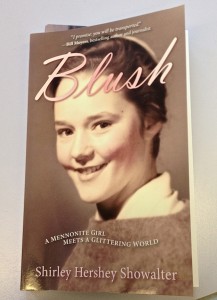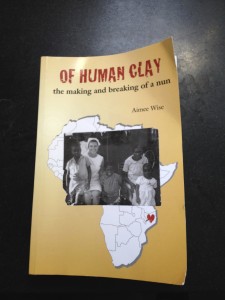 While away in London, I read and reviewed Aimee Wise’s, Of Human Clay. Having set the tone with her “spiritual” memoir, I was eager to continue my reading adventure with another: Blush, A Mennonite Girl Meets A Glittering World, by friend, Shirley Hershey Showalter. Having two women I know publish memoirs simultaneously is thrilling. And both authors have helped me to understand my own need for spiritual comfort and have left me wanting to know more about how spirituality and religion becomes part of our lives and how it effects those around us.
While away in London, I read and reviewed Aimee Wise’s, Of Human Clay. Having set the tone with her “spiritual” memoir, I was eager to continue my reading adventure with another: Blush, A Mennonite Girl Meets A Glittering World, by friend, Shirley Hershey Showalter. Having two women I know publish memoirs simultaneously is thrilling. And both authors have helped me to understand my own need for spiritual comfort and have left me wanting to know more about how spirituality and religion becomes part of our lives and how it effects those around us.
Though each of these women has a different story, a different religion, and culture to deal with, the frustrations and tensions apparent in both stories, are similar. Regardless of what church, synagogue, or temple one worships in, our struggle to be faithful to our God, while being human beings with wants and needs that may fall beyond what we are permitted, are universal.
While Aimee’s book brought back twinges of my early anger with the Catholic Church, I was charmed and delighted with Shirley’s memories of growing up in a conservative, Mennonite farm community in Pennsylvania. Her wish “to be big,” not in the sense of being tall, “but big as in important, successful, influential,” went against all that her church and family represented. To be Mennonite was to be plain and simple: in dress, speech and in all behaviors. To be female and wear a prayer covering on one’s head was to stick out like a sore thumb … part of a religious subculture that a good part of the rest of the world doesn’t notice or choose to explore. In large societies like our own, we’re all too quick to point fingers at and make sometimes cruel jokes about those who are different from the rest of us. Whether it’s our skin color, religion, political affiliation, or sexual orientation, there is always something to gossip and make nasty judgements about.
Reading through Shirley’s memories of her first eighteen years of life, I was struck by how “BIG” she was even when she was small. She seems to have had an intuitive side that brought her through difficult moments in a family and church that she went along with and believed in, despite having her own dreams and aspirations for something more. And though following most of the rules, she never became the expected Mennonite wife, wearing a prayer covering, raising a handful of kids, and helping her husband by doing whatever is necessary to run a sometimes not so profitable farm. Shirley seemed to know, if only on an unconscious level, that she would be more, while still respecting and hanging on to the structural ideals of her church and family. She has done more than succeed as a past president of Goshen College and her work with the Fetzer Institute.
From the beginning, Shirley, named by her mother after the famous child star, Shirley Temple, loved to be with her dad, riding along with him on the tractor and helping out in the other innumerable daily farm chores. Later when her brother and sisters came along, she loved being their teacher, showing them the ways of the natural world, the church, their family and even perhaps the glittering world beyond her parent’s farm. She “blushed” her way through awkward moments when she could barely contain her urges to go beyond what was expected of her. Her parents seemed to understand her concerns and differences with the Bishops of the Mennonite community, allowing her to think for herself while guiding her with gentle kindness.
Of the many heart-warming stories in this memoir, one of my my favorites is when her brother, Henry, gets a “new” second-hand bicycle. Envious of her brother’s good fortune and frustrated by her own old and worn out bike, Shirley, tries to paint hers in an effort to make it look better using odd cans of paint stashed in the barn. She never asked permission to do so and makes a huge mess that most parents would have a huge fit about. When Shirley tells her dad, about her misadventure, adding that “I think you must love Henry more than me,” he purchases the proper paints, takes her bike apart, and repaints it to make it look almost like new. Though her mother reminds her about “envy,” her father doesn’t lecture her on what she has done wrong. This special love and Mennonite kindness, prevails throughout the book, making me wish at times that I had grown up as a member of her family.
Filled with interesting tidbits about the history of the Mennonite church, family stories, along with recipes, footnotes and a glossary of terms I had little to no clue about, Shirley’s book took me on a journey through her early life and who and what has influenced her to become the woman she is today. She says it all best in the final pages of her book in, “Why I Am (Still!) a Mennonite.”
In the complicated world we live in, reading Blush, was for me a calming and refreshing visit to a simpler, less thorny way of living.


